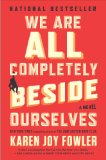Summary | Excerpt | Reading Guide | Reviews | Beyond the Book | Read-Alikes | Genres & Themes | Author Bio

This article relates to We Are All Completely Beside Ourselves
People have debated the rights of animals since early times. The relationship between people and animals has generated many different and widely varying perspectives. Here's a quick trek through some of them, following in animals' footsteps – whether four-footed or two:
 In the 6th century BCE, Pythagoras taught that both animals and humans had souls that reincarnated between the two. However, Aristotle in the 4th century BCE, in his writings on animal classification, placed non-human animals below humans in what became known as the Great Chain of Being.
In the 6th century BCE, Pythagoras taught that both animals and humans had souls that reincarnated between the two. However, Aristotle in the 4th century BCE, in his writings on animal classification, placed non-human animals below humans in what became known as the Great Chain of Being.
Considering that the Book of Genesis tells us that Adam was given dominion over all other living creatures, leading to a widely accepted interpretation of animals as things to be possessed and used by mankind, it is interesting to note that one of the first groups to create legal codes to protect domestic animals from cruelty were the Puritans of the Massachusetts Bay Colony in 1641. Their publication, The Body of Liberties, which was the first printed legal code in America, documented two liberties pertaining to animals:
During the same time period Rene Descartes, in his Meditations, denied that animals were sentient, and thus believed that they could not feel pain or suffering nor could they experience a sense of well being.
By the middle of the 18th century, sentiment in Europe was beginning to shift, as can be seen in Jean Jacque Rousseau's philosophical treatise, Discourse on Inequality (1754), in which he stated his belief that animals have consciousnesses, entitling them to the privilege of being spared from ill treatment.
 In 1824, several Members of Parliament formed the first Society for the Prevention of Cruelty to Animals in London. America formed its own Society in 1866. Charles Darwin, Friedrich Nietzsche, Arthur Schopenhauer and John Stuart Mill were all 19th century proponents of animal rights.
In 1824, several Members of Parliament formed the first Society for the Prevention of Cruelty to Animals in London. America formed its own Society in 1866. Charles Darwin, Friedrich Nietzsche, Arthur Schopenhauer and John Stuart Mill were all 19th century proponents of animal rights.
In the 20th century, various writers and groups took up the cause. The publication of the bestselling Animal Liberation (1975) by Australian philosopher Peter Singer provided a key text for what had become a movement. A number of groups formed to fight abuses against animals, including the Animal Liberation Front (ALF).
 In We Are All Completely Beside Ourselves, Lowell uses his involvement and contacts in the ALF to locate Fern. According to their website, the ALF's mission is "To effectively allocate resources (time and money) to end the 'property' status of nonhuman animals." Their objective is "to abolish institutionalized animal exploitation because it assumes that animals are property." How to Do Animal Rights is a free online book written by conservationist, biologist, animal rights activist and ALF supporter Ben Isacat outlining his philosophy on animal rights.
In We Are All Completely Beside Ourselves, Lowell uses his involvement and contacts in the ALF to locate Fern. According to their website, the ALF's mission is "To effectively allocate resources (time and money) to end the 'property' status of nonhuman animals." Their objective is "to abolish institutionalized animal exploitation because it assumes that animals are property." How to Do Animal Rights is a free online book written by conservationist, biologist, animal rights activist and ALF supporter Ben Isacat outlining his philosophy on animal rights.
ALF is international in scope and while its members claim to be non-violent, critics of the group have accused some activists of arson and vandalism, and some activists connected to ALF have been convicted of illegal or terrorist actions. In 2005, John E. Lewis, Deputy Assistant Director, Counterterrorism Division, Federal Bureau of Investigation, stated, "The eco-terrorist movement has given rise and notoriety to groups such as the ALF, and the Earth Liberation Front, or ELF. These groups exist to commit serious acts of vandalism, and to harass and intimidate owners and employees of the business sector."
Of course there are many other animal rights organizations. National agencies such as The Humane Society of the United States, international agencies such as The International Fund for Animal Welfare, and smaller, more specialized agencies such as The Elephant Sanctuary of Tennessee and The Greyhound Adoption League of Texas, to name just a few, all focus their efforts on animal rights. The list goes on, as does the debate.
First image: Reinterpreted chain of being with living and fossil animals, Ernst Haeckel, 1874. Second image: A painting of the trial of Bill Burns, which led to the world's first known conviction for animal cruelty, after he was found beating his donkey. Third image: One of Ben Isacat's Animal Rights posters.
Filed under Society and Politics
![]() This "beyond the book article" relates to We Are All Completely Beside Ourselves. It originally ran in June 2013 and has been updated for the
February 2014 paperback edition.
Go to magazine.
This "beyond the book article" relates to We Are All Completely Beside Ourselves. It originally ran in June 2013 and has been updated for the
February 2014 paperback edition.
Go to magazine.
Your guide toexceptional books
BookBrowse seeks out and recommends the best in contemporary fiction and nonfiction—books that not only engage and entertain but also deepen our understanding of ourselves and the world around us.